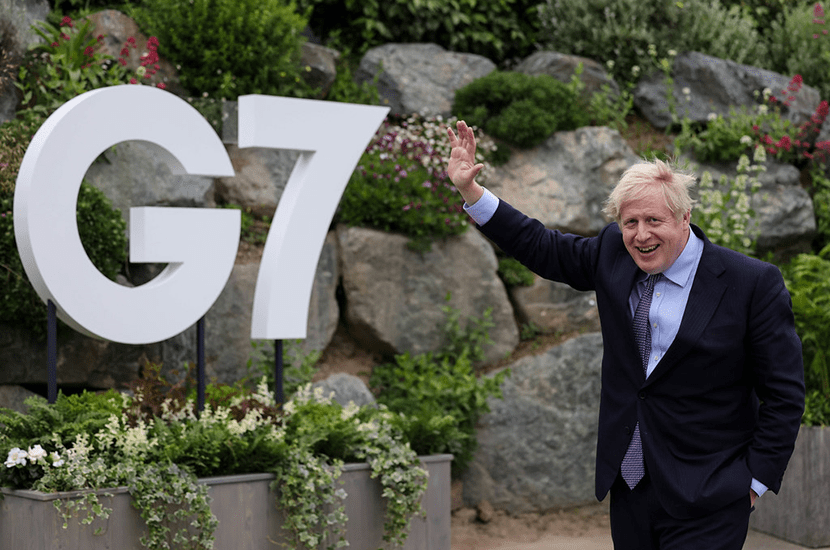It’s risky planning a trip to the British seaside at any time of year. But if the weather forecast is to be believed, Boris Johnson will get away with this gamble at the weekend’s meeting of the G7 at Carbis Bay in Cornwall.
Brexit’s critics were always going to seize on any evidence that Britain was being sidelined by the rest of the world after we left the EU. So it is fortunate for the government that the UK is the host of this year’s summit because it has placed this country at the centre of things.
This G7 is unusually consequential. It is the first time that these leaders have met in person for well over a year. This will give the meeting momentum; it would be hard to think of a worse format for diplomacy than group video calls. It is also the first summit of the new US administration. Every G7 summit when Donald Trump was in the White House was a damage-limitation exercise. But Joe Biden is an old-school believer in the western alliance and he will be keen to make these events work. Just look at the G7 deal on a global minimum level of corporation tax. This was achieved, in large part, because of America’s willingness to let other major economies tax its giant technology firms. Finally, this week’s summit has an immediate practical problem to solve: how can the developing world get enough vaccine doses? (In a sign of how Covid is still derailing diplomacy, India’s Prime Minister Narendra Modi will only attend virtually because of the severity of the pandemic there.)

Britain’s international role can’t just be built on hosting summits, of course. Influential government figures argue that this week you can see the priorities of the UK’s new foreign policy emerging.
The first is the US relationship. As Biden was preparing to take office at the start of the year, many in the media speculated that Britain would be hampered in its bid to have a good relationship with Biden’s team because of its previous close ties to the Trump administration. This has turned out to be wrong. The US and UK’s foreign policy agendas are more closely aligned now than they were under Trump. Biden has also gone out of his way to soothe Britain’s diplomatic anxieties — Johnson was the first European leader that Biden spoke to as President.
This G7 is unusually consequential. It is the first time that these leaders have met in person for well over a year
The US and the UK both believe that the world is entering into a new era of competition between the democratic and autocratic worlds. This is a view that’s not yet shared by all of the G7. The UK has chosen to invite Australia, India, South Korea and South Africa to this year’s summit to launch a ‘Democratic 11’ of free countries. Biden wants this to pave the way to an international ‘Summit for Democracy’. The South Africans are a late addition to the summit after there were objections that the initial plan for a ‘D10’ lacked African representation. But the Asian tilt of this group is no accident. The UK sees this as crucial to any effort to contain China.
One potential irritant to the US-UK relationship is the Northern Ireland protocol. As the UK-EU standoff over the issue intensifies, Biden — who makes much of his Irish ancestry — is expected to raise the issue with Johnson this week in their bilateral discussions, though even the EU expects the intervention to be relatively mild. However, now that Johnson and David Frost, the cabinet minister responsible for handling the European Union, are explicit that the UK’s principal concern is the protection of the Good Friday Agreement, rather than the protocol itself, it is impossible to see how this issue won’t flare up again.
The second priority is collective security. If the UK had one great diplomatic success during the Trump years, it was in keeping Nato together. Given Trump’s ambiguity about the whole principle that an attack on one was an attack on all, it is an achievement in itself that the alliance has survived.
After the G7 is over, Biden will travel to Brussels for the Nato summit next week. The White House has confirmed that Russian authoritarianism will be discussed, demonstrating the alliance’s traditional utility. But Russia is, ultimately, a declining threat. As America’s focus shifts to the Pacific, Nato will need to become more relevant to the struggle to contain China. This will have to involve partnerships with groups such as the Quad — the emerging alliance of the US, Japan, India and Australia, which is working to counter China in the South China Sea.
The UK, with its connections to India and Australia and its role as the biggest European contributor to Nato, is well placed to argue for this shift. It will not be easy to move the alliance in this direction given, for instance, Germany’s publicly stated desire not to divide the world into opposing blocs. But attitudes to Beijing are changing fast. The EU signed an investment treaty with China at the end of last year — yet just three months later it joined a coordinated western effort to impose sanctions on Chinese officials over abuses in Xinjiang.
The final priority is free trade. The UK hopes to sign its first full post-Brexit trade deal later this month. The deal with Australia is part of the UK push to join the CPTPP, an 11-nation free trade agreement centred on the Pacific. If the UK joins this agreement, it will not only deepen this country’s links with an area of growing economic and strategic importance but it will also ensure that the UK is part of a group that would become crucial to the global trading system if tensions between the West and China were to make it impossible for the World Trade Organisation to function.
The idea that Brexit would lead to a catastrophic loss of Britain’s global influence has always been fanciful. After Brexit, the UK has — in proof of the old adage that necessity is the mother of invention — become a nimbler player on the world stage. Look at how it has repeatedly led the way in terms of sanctions on Belarus.
But the UK does need to stabilise its relationship with the EU. It will be that much harder for the free world to stand up to Russia and China if the UK is at loggerheads with its neighbours. It is going to require compromise and humility on both sides to fix the issues around the Northern Ireland protocol. It would be bad for the western alliance if Britain and the EU became the European equivalent of Japan and South Korea, two key US allies who fall out at the slightest provocation.







Comments